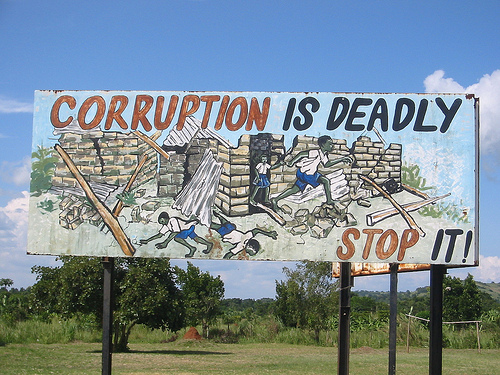![]() photo credit: futureatlas.com
photo credit: futureatlas.com
A friend recently threw out the juicy question of how we can help improve government transparency and accountability in India. Here are my thoughts on how Indian democracy needs improvement towards that end. And raising the ugly head of corruption in this discussion is all too inevitable.
Oh, before we start, it’s worth noting that an imminent management guru C K Prahalad and his team have estimated through some “back of the envelope” and therefore dubious analysis (see this) that on an annual basis, political corruption costs India about 250,000 crore Rupees, which comes to roughly US$60 billion. I take offence to this number because it seems like a gross underestimate. How could only 15% of our GDP be mis-appropriated and mis-used? Transparency International rated each Indian state in its corruption index and found that the police topped in corruption followed by forestry, land records, registration & housing, electricity, banking, education, water supply and the National Rural Employment Guarantee Scheme. Considering that this covers all major ministries, and when just simply looking around at decrepit Indian systems like the Public Distribution System that experiences so much leakage (refer supreme court’s order), and you know that this C K Prahalad number needs to be revised upward to at least 30%. For those who’d like an idea of the scale of political or politically-connected corruption unearthed just last year (and of course this would be the top of the iceberg), see this. Even our Prime Minister has gone on the record that corruption is now endemic in India . And a lot of this is traced back to lack of government accountability on one hand, and over-government on the other.
Starting by electing the right people would help, through a process that is protected and free.
We need to ensure that voters in poor and easily subverted communities are provided their democratic right to secret ballot. The idea is to mitigate avenues for thugs buying votes through strong-arm tactics. This will happen only when social-impact projects put sustainable livelihoods and consumer power in the hands of poorer people; who are then less liable to be coerced by thugs posing as politicians.
We also need to revisit campaign finance reform, especially private hard and soft money cash contributions. At minimum, this business of disgusting Mayawati being garlanded with a Rs 2 crore worth of currency notes simply has to stop; not least because she comes from a beleaguered Dalit background which is supposedly more frugal with resources.
Then we need to create transparency and a nomination and selection process for the head of political parties; disallowing discretionary selection by powerful leaders. Sonia Gandhi cannot be allowed to bend the rules and nominate whomever she pleases; todays its the puppet Sikh, tomorrow it’ll be the prodigal son.
We also need to disallow convicted felons from ever running for public office; public records now show that a massive proportion of our Indian political system is criminalized (and we still call this the world’s largest democracy; what an utter farce). There cannot be loopholes in this provision, especially for criminals who have apparently served out their prior punishments.
And finally, I believe we must enact law to require all able-bodied and working citizens vote or else explicitly abstain, failing which there is some symbolic fine (as in Australia) . Arguments against compulsory voting are as pathetic as those made by a 50-caliber gun-toting nut job in the US saying that gun control goes against their fundamental right to bear arms. Middle and upper class Indians are especially apathetic to their nation’s woes, though they carp on about how this or that needs to be fixed. How about you start by the simple act of casting your vote? And taking at least some responsibility for the condition of the Indian ‘banana republic.’ Other resources on compulsory voting are here .
Fixing governance processes and providing for adequate oversight is the next area needing help.
Encouraging more decentralized governance, down to Panchayati level, is important to push toward. Providing more budgetary autonomy to states within a federal system of standards and laws is a must; else we will move to a mis-managed system like in the US where abortion law (arguably a less significant issue than many other things) become so federally interfered that it completely distracts the polity from the real work at hand.
We also need to hand over program management of government projects to experienced firms like TCS, and use performance metrics to track and manage public works projects that are prone to capital siphoning which is now affectionately called “leakage”. Procurement and supplier selection processes also need to be improved, and irregularities investigated. It is encouraging that the Nandan Nilekani -led UID (universal identity) project for giving everyone in India a well-authenticated identify (for financial inclusion and other purposes) is being received well across the states and center, and now he is chairman for the TAG (Technology Advisory Group) which will advise the government on all of its major IT transformation projects.
We need to encourage activists and whistle-blowers to more actively use the Right to Information Act and other tools to safely expose and embarrass politicians and lobbyists who are engaged in corrupt and illicit activity. And not just to have politicians and fraudsters use the act to target their enemies and busy the system in even more paperwork. Initiatives like Shaffi Mather’s BPO to report bribes and fight corruption ; Karmayog’s website, and Karnataka’s Fight Corruption efforts must be encouraged. More specifically, we need to strengthen our supposedly independent bureaus (such as Karnataka’s Lokayukta, who have done some amazing and daring work such as unearthing illegal wealth of Rs 317 crore from 198 raids in the last 3 years alone) so they can continue to independently uncover undeclared assets of public servants, and immediately impound such undeclared assets. And finally, we need to build upon the grassroots insights of reports such as the India Corruption & Bribery Report such as “77% of all reported bribe demands in India are related to the avoidance of harm, including securing the timely delivery of a service” and “a whooping 91% of reported bribe demands originate from government officials in India”, especially the police and then the central government officials.”
There is also a dire need to disentangle the tentacles of the public sector and government from the private sector. Because the supposedly “private” sector filled a huge governance void post-independence, and because we started out as a heavily socialist leaning republic, we are now weighed down by the government that interferes in all our major enterprises, many of which are oligarchic conglomerates that thrive on gross amounts on undue political favor. This invisible tax on our economy can rightly be termed Licence Raj 2.0. A decent analysis of the scale at which big government has stymied our economic freedoms, while not self-regulating and instead allowing for massive illicit wealth creation, is provided here
We must also impose strict penalties and criminal justice on political and religious leaders and that incite religious or social tensions. In an ethnic tinder box like India this public protection from hate-mongering is a must have. Else we allow a new generation of Hafiz Saeed -like terrorists to take root amidst us.
And of course, in support of all of the above activities, we also need to use advances in IT to convert paper trails, more prone to misuse, to more traceable electronic trails. And all government payments and receipts must be made available to the public readily, if not by resorting to the Right to Information Act.
And finally, rewarding and instilling excellence in the performance of public servants and their projects is the final area requiring significant attention.
This will help encourage positive participation in government. Publicly awards (including monetary sums) must be allocated for those public servants who excel in meeting specific project expectations. The media must be used to actively market a career in public service to young aspirants in a more compelling way, Youth Congress style.
Additionally, now that the Foreign Education Bill has been passed for allowing more FDI, somebody big in the education (or investment) sector needs to bring to India i.e, franchise Peter Eigen’s Transparency International -inspired Governance School and Center for Civil Society (based in Germany). This will help build more ethically competent civil society leaders, and build on top of our Indian Administrative Service and other similar programs.
Finally, grassroots civil society’s liberties and protection groups must be encouraged to organize and have a legal voice, and they must be granted recourse and a forum to prosecute class-action suits against fraudulent government funded programs.
It would be interesting for us to track advancements in each of these areas, such as through the Corruption Free India groups like this . Anyone having information on initiatives that are stemming mis-governance is encouraged to respond and participate.

